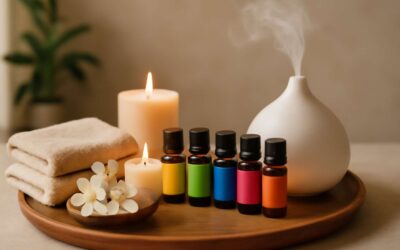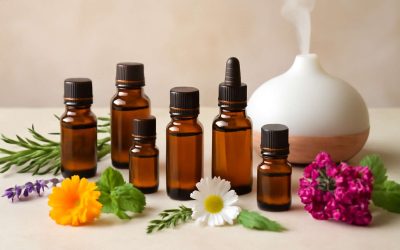
Many people use essential oils to create a soothing environment, boost moods and promote relaxation. Diffusing oil is a convenient way to experience the therapeutic benefits of aromatherapy without having to apply the oils directly onto your skin. The scents from certain oil blends are thought to reduce fatigue and anxiety, help you sleep better, ease stomach discomfort, soothe muscle tension, aid sinuses and enhance mood. The benefits of aromatherapy are numerous and, when used with a diffuser, can be enjoyed throughout the day or evening for a relaxing experience.
The aromas emitted from certain oils are thought to activate the release of neurotransmitters, chemical messengers that trigger a sense of well-being. Diffusing essential oils can also make it easier to fall asleep, calm agitation and insomnia, relieve nausea and headaches, ease breathing, combat stress and depression, and protect against illness.
Essential oils are concentrated extracts from a variety of fragrant plants and typically require steam distillation or mechanical pressing to be extracted. They are typically bottled and labeled for aromatherapy purposes and are not regulated by the Food and Drug Administration (FDA). Nelson advises anyone interested in using a diffuser to choose a formula that is safe for direct inhalation and read all instructions carefully. She also recommends purchasing essential oils that have been distilled using clean methods as opposed to those that are heated, which can create toxic fumes.
Most diffusers come with a timer setting that allows users to adjust how long the scent is left in the air. Each oil has a different aromatic profile that lasts for a different amount of time: top notes, like peppermint and lavender, evaporate relatively quickly, while middle notes, like chamomile and ylang-ylang, can be detected for up to two hours. Base notes, like myrrh and cedarwood, are heavier and may linger for up to five hours or more. A balanced synergy between the different types of essential oils is important to ensure that the scent does not overpower a space and to maximize therapeutic benefit.
Certain essential oil combinations are thought to aid in easing breathing by clearing congestion and preventing dry coughing. Others are believed to help with achy joints and muscles, as well as bloating caused by indigestion or gas. A few oils are considered endocrine disruptors, however, and may cause hormone-related complications, including prepubertal gynecomastia in boys. (Lavender and tea tree oil are examples of this.) For these reasons, it is recommended to avoid diffusing them if you are pregnant or breastfeeding.
Taking time for self-care, like running an aroma diffuser at home, is thought to improve mood by boosting feelings of happiness and satisfaction. Aromatherapy is also thought to reduce symptoms of depression and anxiety, ease gastrointestinal discomfort and stimulate the body’s natural immune system. As an added bonus, a number of essential oils are known to help maintain healthy skin and alleviate dryness and itching. When diluted properly, these oils can be safely applied to the skin and kneaded into sore or stiff muscles to ease pain and supple the tissues.


0 Comments